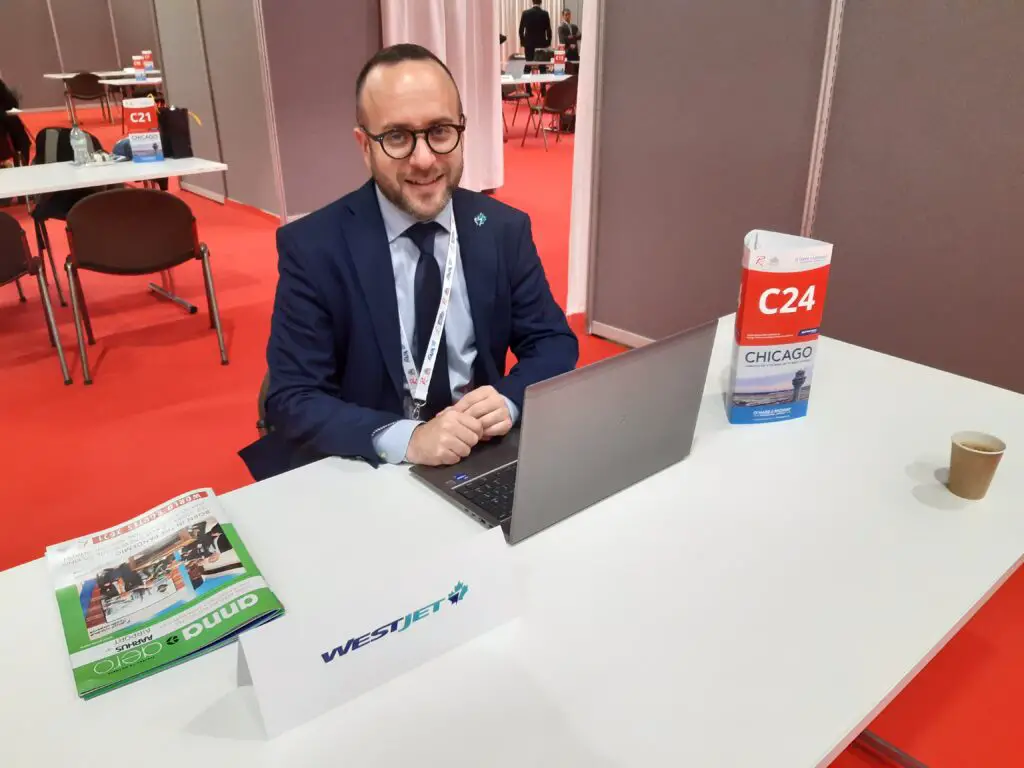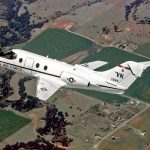The Canadian air market was one that saw particular struggle in the last two years as the COVID-19 restrictions in the country were quite harsh.
As the world leaves the pandemic behind, however, the market there is starting to heat up, and the World Routes 2021 came in very handy for the local airlines, including WestJet.
The low-cost carrier founded in the 1990s was going transatlantic and adding widebodies to its fleet – in a world where time and again low-cost transatlantic travel had previously failed – and, surprisingly, seeing relative success; obviously the pandemic disrupted such plans.
Aviacionline spoke to WestJet’s Frank Satusky, who less than two months ago joined the airline, coming from Air Canada, as Director for Network and Schedule Planning. We discussed the company’s future plans leaving the pandemic and what’s next for the Canadian LCC.
Aviacionline (AL): First of all, tell me more about yourself and how you got in this position in your career.
Frank Satusky (FS): After 12 years working at another airline in various roles, in network planning, scheduling and alliances, I made the move to WestJet. I’ve been in the role now for less than a month, but it was a great opportunity to go work for a relatively young 25 year old carrier with aspirations of greater things, which is looking to become more of a global airline from our roots of being a low-cost carrier.
AL: At the same time, is it any more difficult for you to get in the middle of the crisis instead of arriving before the crisis? What change is there in your mindset when you take decisions from now?
FS: I think it’s a great time, actually, to be joining. During the crisis from a network planning perspective, it wasn’t the best time, wasn’t the easiest time, whereas now we have the ability to reshape our network going forward. We want to rebuild markets that did well for us in the past. We want to build those back up.
But we have the opportunity to refine our network and take out parts of it that may have underperformed before, and go after new opportunities. As we go through the recovery, there’s been a lot of talk about VFR markets, there’s been a lot of talk about leisure markets and WestJet is pretty well positioned to go after both of those businesses in a greater way. Leisure markets are where we started and that’s where we want to continue to grow, and the market is really geared to that.
AL: But now you’ve got a big problem to deal with, because before you had a 737-only fleet, then you started to expand aggressively in the transatlantic market. How do you reposition this [flying]? Now [it’s an] important size of your business going forward.
FS: Well, we’ve done a few things on the fleet side. We did start off transatlantic service quite a few years ago with 737s from Halifax and St.John’s, on the East Coast, to Europe. We were one of the first to use 737s across the Atlantic. Then in 2016 we added 767s. These are older aircraft, [it] was an interim solution for us until we got 787s.
So COVID allowed us to take the 767s out of the fleet and really focus our international growth on 787s and it gives us a good opportunity to pivot our business a little bit and really focus on the Transatlantic markets. With all the pent up demand that we’ve seen in the last couple of years, we’re fairly convinced that Canadians are ready to travel again. Demand is there.
AL: Right now transatlantic is a miserable market, but do you expect it to improve like it was, and if so, when?
FS: Canadians have always enjoyed travelling to Europe. It’s been a strong business for many decades. We believe that the restrictions that are in place now are going to lessen over time; we are working at various levels of government to ensure that things remain safe but that Canadians also have the ability to travel freely, and we’re hopeful that by next summer that we will see the lid on the demand that exists now come off and then we’ll actually see Canadians travelling in greater numbers by next Summer. We think [that] after two years of basically not travelling across the Atlantic, it’s going to come back very strong.
AL: [During COVID, flying in] Canada was quite shrunk, right? Even though massively [restricted], was it possible? I mean – you survived, but what is the way going forward now? Is domestic going well, is it going bad – where are we right now?
FS: What we’ve seen in all geographies are as the barriers to travel go away; the demand comes back almost immediately. In Canada, we had some provinces with a lot of travel restrictions, so we were faced with interprovincial barriers for the first time in Canadian history. It was very hard for us to plan a network when a lot of our business is from coast to coast, between provinces, so we had to scale back quickly. For a while, we exited the Atlantic provinces almost completely. Now we’re back in all provinces, [still] figuring out the correct level of capacity, but [flying] more, and we’ve seen the business follow.
AL: it does return quickly, but does it return with the same paying price or not?
FS: We know in this business that we go for traffic first and then you build the yield once you have the traffic. We’re still working through getting the yields to the point where we want them, and our Revenue Management team is working hard on that front.
But overall, we’re pretty happy with the performance. As the bookings are coming in, we’re able to manage a lot better. During COVID, it was a lot harder to manage in a low demand environment; we were happy to take whatever bookings came in. We’re seeing fares now moving in the right direction.
AL: [Your network] is interesting because Canada, in terms of population, is quite a small country and [you have] 3 big bases. Why is that? Why don’t you concentrate on just one base?
FS: We have three hubs, and we will continue to focus on building our three hubs. But part of WestJet’s mandate is to be across the country; we have bases across the country, from Vancouver to Halifax and everything in between, and we want to continue to grow, and our focus also needs to be on building that up. Calgary will remain our main base of operations and Vancouver and Toronto our other major hubs – we want to continue to grow our hubs, while remaining present across the country.
AL: Yet you position yourselves as a low-cost carrier, right? How do you present yourself to the market versus Air Canada, which is an established company and it doesn’t sell itself as a low-cost carrier?
FS: Well, we like to refer to ourselves as a hybrid carrier in that we do have 787s with a lie-flat business product, a Premium Economy offering and a competitive economy product. We now have Premium class in all of our 737s, this is something we took advantage of downtime during COVID to do. So, we still stay true to our leisure routes, but we are open for business, and we are happy to take a larger share of the corporate market as we grow.
AL: Talk about leisure. What is your plan for the Caribbean?
FS: So, our goal first is to get back into all the destinations we [flew] in the Caribbean. We’re looking at some new destinations as we go back. We do want to expand our footprint because this is one of the strongest parts of our business. In the same way as we see Europe being very strong next summer, we know winters in Canada are cold and Canadians would love to go to the Caribbean and Mexico, so our goal is to get our network back to where it was before. And then we go to the next set of destinations.
AL: What about the United States? I mean, it’s the most important market for you guys but at the same time Canada was closed for people coming from America [during COVID]. How did you deal with it? Your biggest market disappeared overnight. What is – again – the way going forward?
FS: That was one of the most difficult parts for us, to walk away from our transborder network, which is a very important part of our network. We’ve gone back in, market by market, and we want to keep growing there. We have a great partnership with Delta and we want to continue to work on that partnership, it’s very important to us.
And we want to continue to add destinations, primarily where Canadians want to go, and focus on the same leisure destinations; whether it’s places like Arizona, Las Vegas, California, Florida and continue to build up our network into there while also adding some some of the business markets that we that we may have underserved in the past.
AL: At the same time, going back to Europe now, time and time again low-costs tried [transatlantic flying] and failed even before COVID. So how do you position yourselves in this situation – are you a hybrid or a low-cost carrier?
FS: Very good question. We are a hub carrier; we are a network carrier. And we want to use our 787s out of our hubs to build, not as a pure low-cost model where it’s just point-to-point traffic, but as a network carrier. And we will use our hubs to carry flows from across North America, across the Atlantic, into Europe and beyond. And that will be our advantage over other carriers who have tried and failed in the low-cost Transatlantic segment.
We’ve also seen that capacity overall across the Atlantic to Canada is down next summer, so we see a great opportunity for us to move into that space in a larger way.
AL: So you do want to try to occupy the space that Norwegian left or it’s not a specific mission in your mind?
FS: [The mission] is to fill in the gaps wherever the competitors have moved away and where we see an advantage when we see demand – that’s where we’ll go in. Norwegian’s operation to Canada was largely focused on the 737s, so short haul type, that’s easy for us to respond to with the 737 MAX-8
That’s why we’ve launched service from Toronto to Edinburgh, Glasgow and Dublin. We saw a great opportunity there, in addition to further long-haul markets with the 787 – there have been capacity reductions by both our domestic competitors and by foreign competitors, and wherever we see opportunities we will evaluate and respond.
AL: Where else do you see gaps?
FS: Well, I would say at some point in our future we want to expand our network into other geographies – we’ve talked about Asia, into South America, we see growth potential in the future. Definitely in the Asian market we’ve seen that the recovery is slower, there’s still a lot of restrictions in place. So we’ll be more cautious if we’re going into those markets, but we will look at it seriously.
AL: And in this situation, how are you preparing to go to war with Air Canada? Because at this point, they are the strongest player in this field.
FS: We certainly don’t view it as a war. We want to compete, and we see a lot of opportunity for a strong second network carrier from Canada across the Atlantic. And we are going to look to markets where we believe that there’s demand beyond the capacity that’s in there.
AL: At the same time, you just left Air Canada. So, why’s that? Why did you leave a stable position to go to Air Canada’s nemesis?
FS: There’s a lot of excitement at WestJet. It’s a great platform for growth, whereas Air Canada is a very established carrier and has been very successful. WestJet is a great growth platform with a lower-cost model. Our 787 is, we believe, perfectly configured for the recovery with 320 seats, 16 seats business class, lie-flats, a 28 seat Premium Economy section, which performs exceptionally well, and then a lot of Economy seats which will help drive volume. We believe we’re uniquely positioned to respond to the new market realities.
AL: In the next couple of years which change do you plan to make in the market – [or] what can you do towards that?
FS: I think the transatlantic market is one that we have started off and it has been successful – and now it’s time to take that growth into the next step. A lot of that business is going to be new for us and complementary to our existing business. So, whereas we’ve been very strong in the leisure markets to the Caribbean, and the US and domestic markets, now we’ll add the transatlantic leisure market to our portfolio.
AL: Is Air Canada unbeatable?
FS: No, they’re not unbeatable. There are markets where we have a unique advantage. Certainly, out of our Calgary hub, we are the strongest player, and we will continue to be the strongest player in Calgary and compete hard for business everywhere else across the country.














